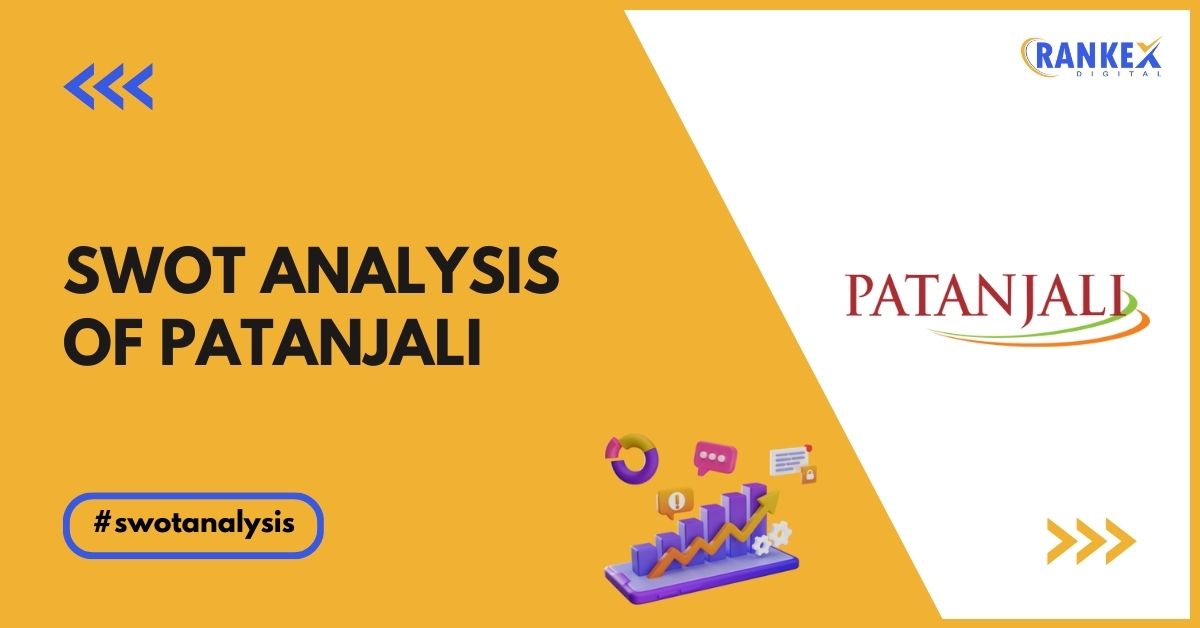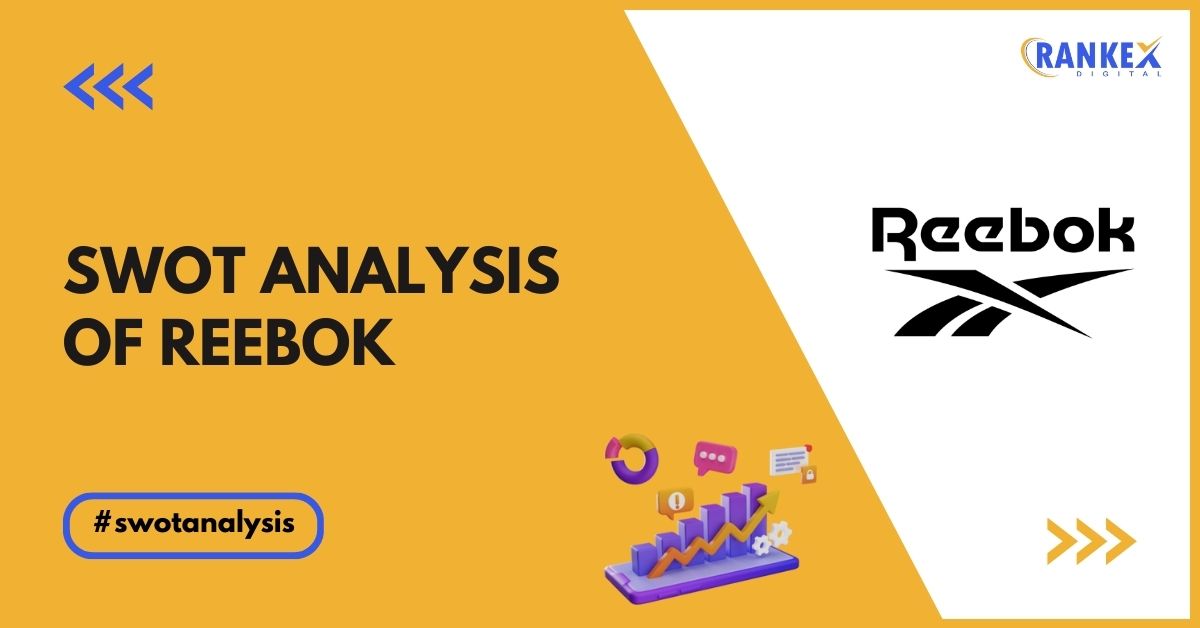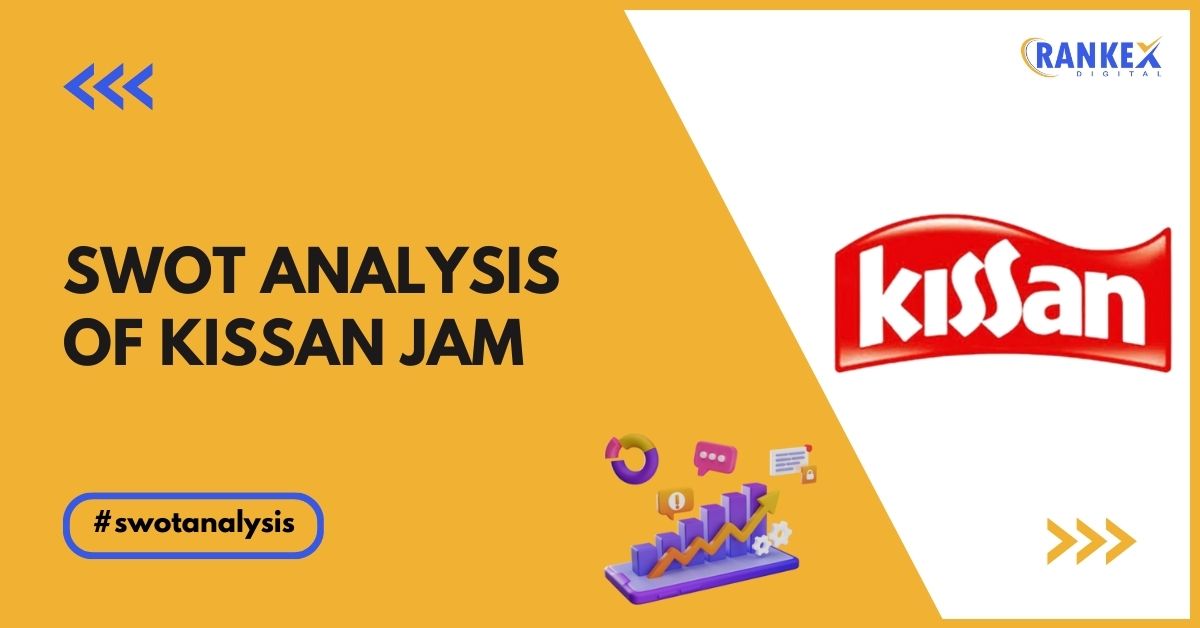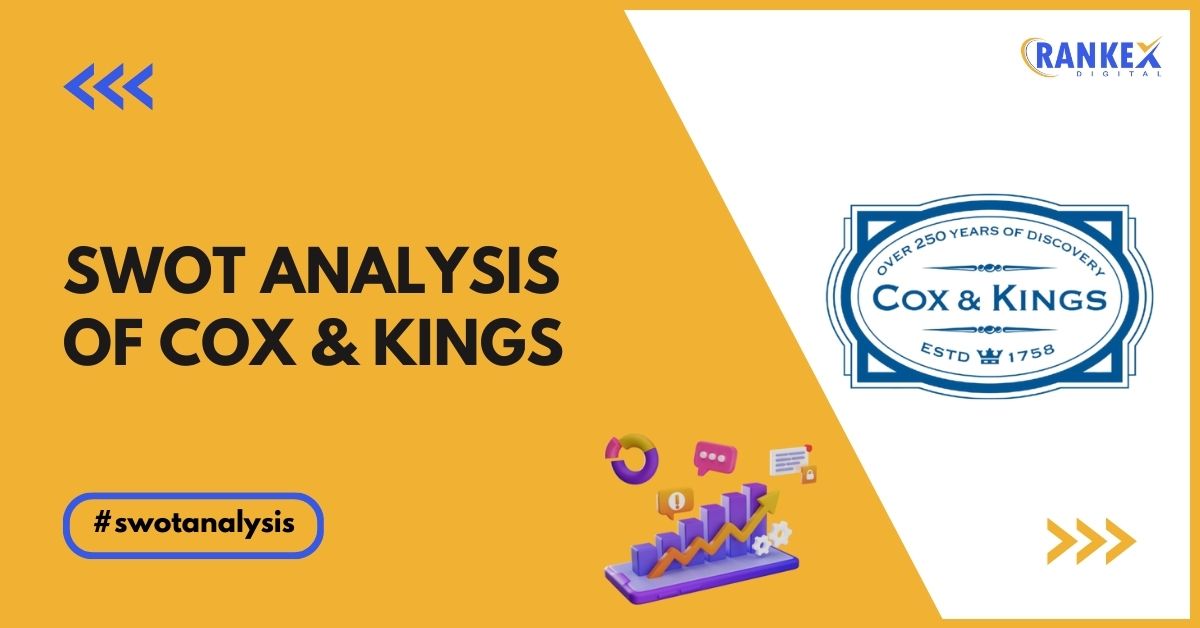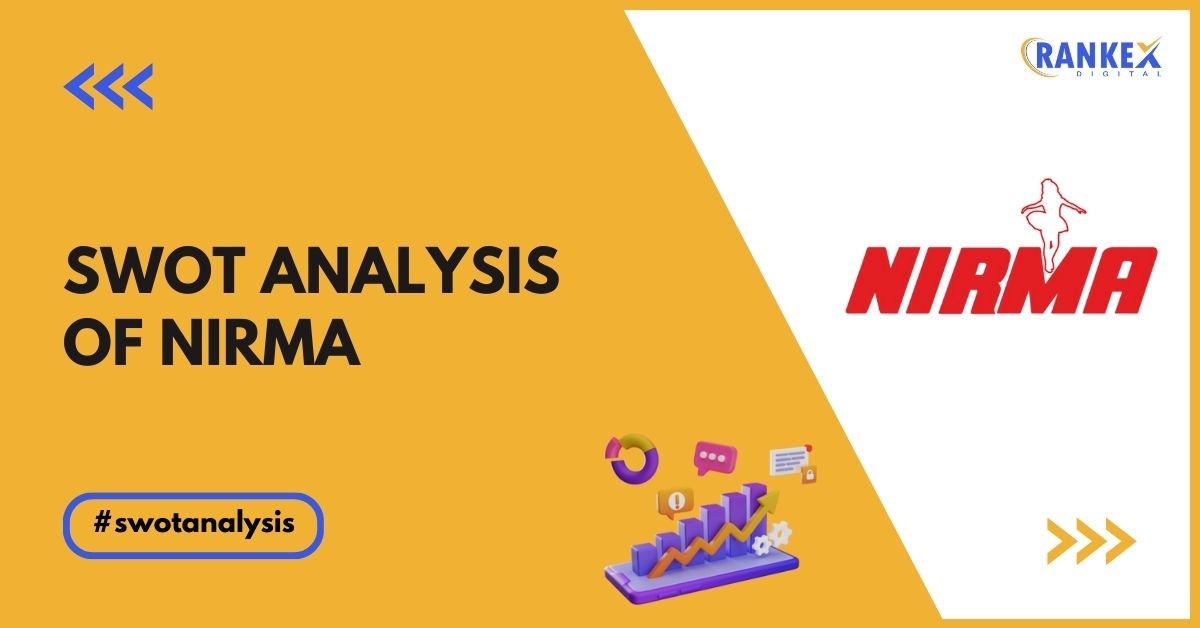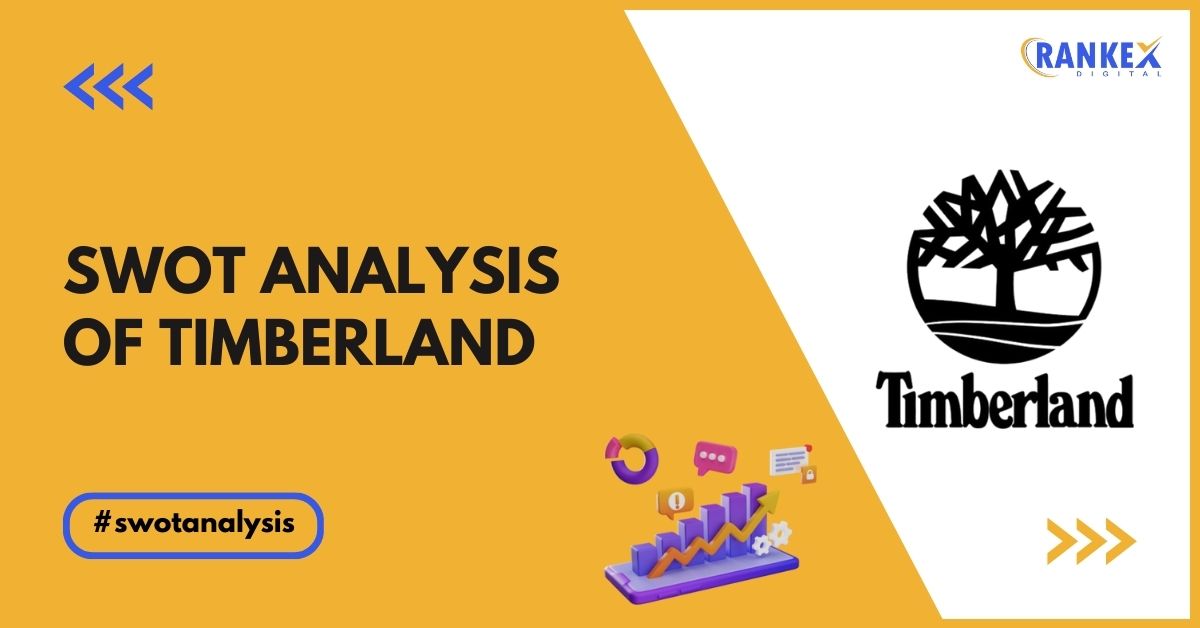Patanjali Ayurved, founded by Baba Ramdev and Acharya Balkrishna in 2006, has become a dominant player in India’s FMCG (Fast-Moving Consumer Goods) sector by focusing on Ayurveda, natural, and herbal products.
The company’s brand identity is closely associated with health and wellness, as well as its “Make in India” ethos. Are you looking for a detailed swot analysis of Patanjali brand?
As of 2025, Patanjali continues to grow, competing with multinational giants in sectors such as personal care, food products, and healthcare.
In this blog
Overview of Patanjali
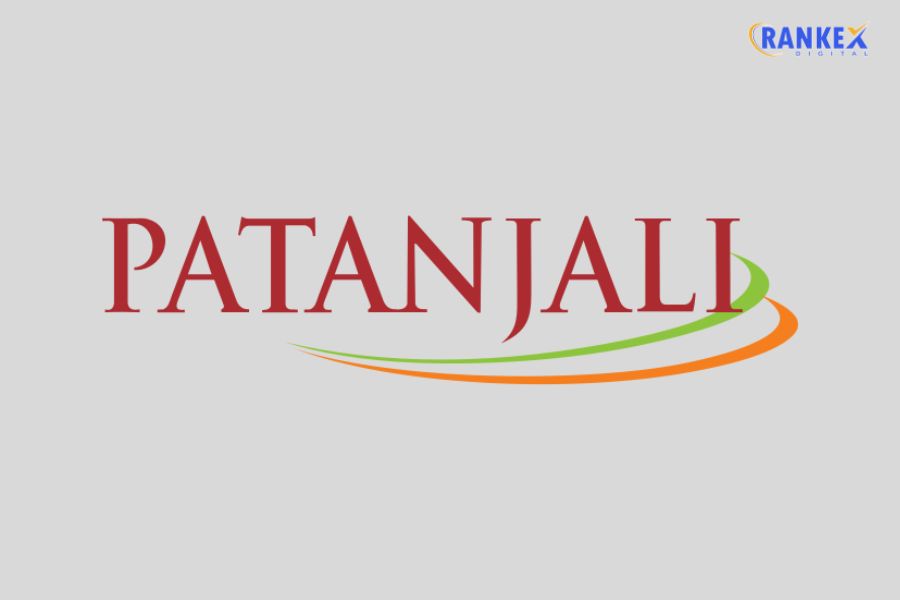
| Founders | Baba Ramdev, Acharya Balkrishna |
|---|---|
| Year Founded | 2006 |
| Origin | India |
| Industry | FMCG (Ayurvedic, Personal Care, Healthcare) |
| Annual Revenue | $1.6 billion (FY 2023) |
| Employees | 50,000+ |
Patanjali is deeply rooted in the Indian tradition of Ayurveda and emphasizes natural, herbal products for health and wellness. It has a diversified portfolio that includes food, personal care, and healthcare products, making it a strong contender in India’s FMCG space.
Current News on the Market on Patanjali
- Expansion into Pharmaceuticals: Patanjali continues to expand its presence in the pharmaceutical sector, particularly focusing on Ayurvedic medicines and immunity-boosting products.
- Entry into Dairy and Packaged Food Markets: In 2023, Patanjali made strides into the dairy and packaged foods segments, intensifying competition with established brands like Amul and Nestle.
- Growth in International Markets: Patanjali is gradually increasing its global footprint, especially in markets where there is growing demand for Ayurvedic and natural products.
- Profitability Focus: The company has been working towards improving profitability by expanding its product offerings in premium categories and enhancing distribution in urban markets.
- Sustainability Initiatives: Patanjali is moving towards environmentally friendly packaging and sustainable farming practices, aligning with global trends toward eco-conscious consumerism.
SWOT Analysis of Patanjali
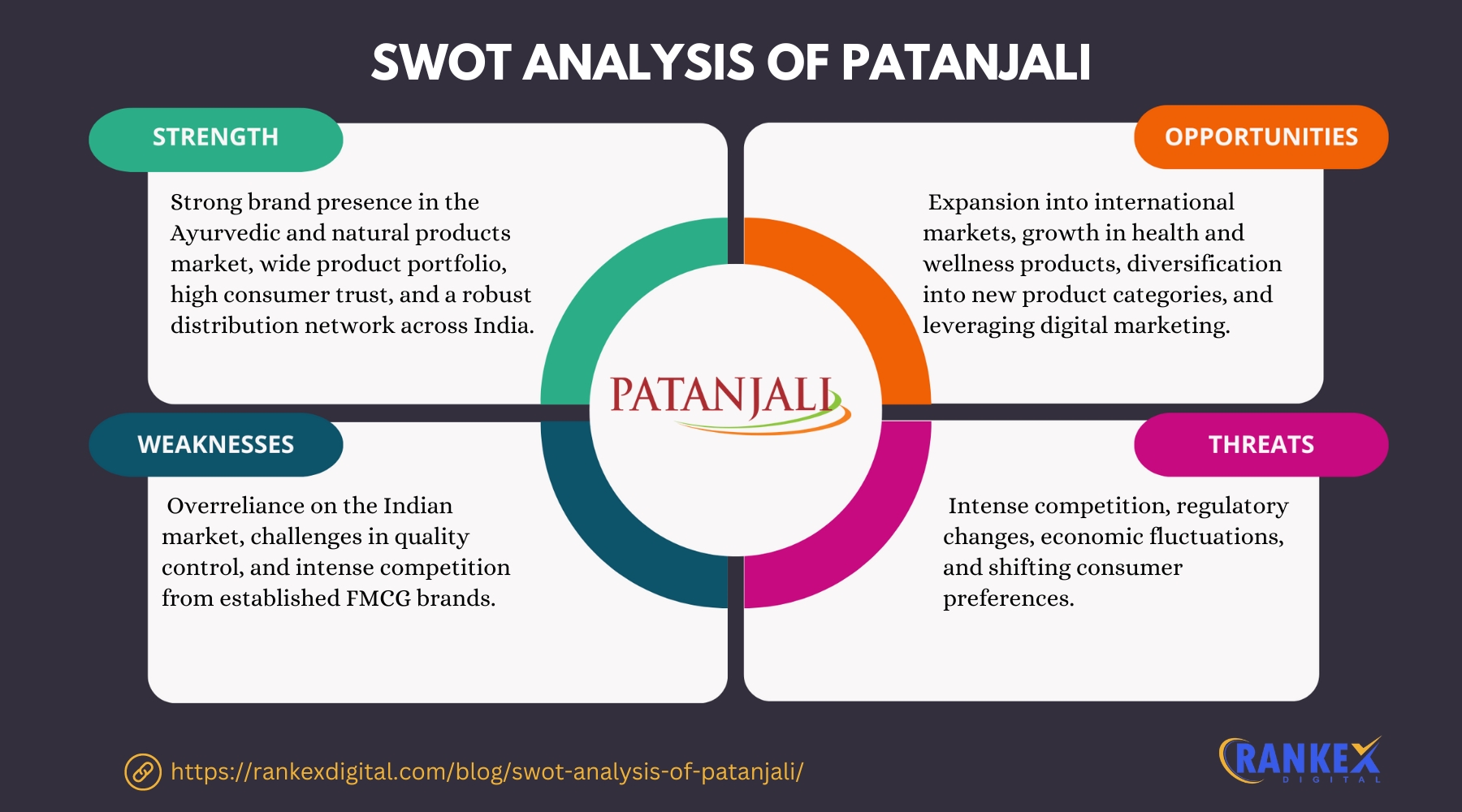
Strengths of Patanjali
- Strong Brand Association with Ayurveda and Natural Products
Patanjali’s brand identity is synonymous with Ayurvedic, herbal, and natural products. This association with wellness and traditional Indian practices has earned it a loyal customer base, especially among health-conscious consumers. - Wide Product Range
Patanjali offers a vast portfolio of products ranging from food, personal care, health supplements, to Ayurvedic medicines. This diversified product base allows the company to cater to various consumer needs and expand its market presence. - Cost-Effective Pricing
Patanjali’s products are often priced lower than competitors, making them affordable to a wide range of consumers, particularly in price-sensitive markets. Its value-for-money proposition helps it compete with both local and international FMCG giants. - Strong Domestic Distribution Network
Patanjali has built an extensive distribution network across India, covering urban, semi-urban, and rural areas. The brand has its products in thousands of retail outlets, including standalone stores and major supermarket chains. - Baba Ramdev’s Influence
Baba Ramdev’s influence and public persona as a yoga guru and health advocate have contributed significantly to Patanjali’s brand trust and credibility. His role as a spokesperson has enhanced the brand’s appeal.
Weaknesses of Patanjali
- Quality and Safety Concerns
Patanjali has faced several controversies related to the quality and safety of its products. Allegations about adulteration and poor quality control have occasionally tarnished its reputation and led to a loss of consumer trust. - Dependence on Baba Ramdev’s Public Image
The brand is heavily reliant on Baba Ramdev’s image and influence. Any controversies or negative publicity surrounding him could affect the company’s market position and consumer confidence. - Limited Global Reach
While Patanjali has expanded internationally, its global presence remains limited compared to multinational competitors. Regulatory challenges and competition in foreign markets have slowed its expansion. - Low Product Differentiation
Many of Patanjali’s products, particularly in the personal care and food categories, have low differentiation when compared to competitors. This makes it difficult for the company to command premium pricing in certain segments. - Inconsistent Supply Chain Management
Patanjali has faced challenges in maintaining a consistent supply chain, especially as it scaled up its operations rapidly. This has led to stock shortages and logistical challenges in some markets.
Opportunities for Patanjali
- Growing Demand for Organic and Ayurvedic Products
With the increasing trend toward health, wellness, and organic products, Patanjali is well-positioned to capitalize on the growing demand for Ayurvedic and herbal products. It can continue to innovate in this space to attract health-conscious consumers. - Expansion into Pharmaceuticals and Wellness
Patanjali’s entry into the pharmaceutical sector, particularly Ayurvedic medicines and immunity-boosting products, presents significant growth opportunities as consumers seek more natural healthcare alternatives. - Leveraging E-commerce Platforms
As online shopping continues to grow, Patanjali can further strengthen its presence on e-commerce platforms. By enhancing its digital marketing and expanding online sales, it can reach a broader, tech-savvy customer base. - Partnerships and Collaborations
Patanjali can explore partnerships with other companies, both domestically and internationally, to co-develop products or expand its market reach. Collaborating with organic farmers or sustainable sourcing initiatives can enhance its brand image. - Sustainability and Eco-friendly Practices
With a rising global focus on sustainability, Patanjali can enhance its eco-friendly packaging, organic farming, and sustainable production practices, aligning itself with environmentally conscious consumers and gaining a competitive edge.
Threats to Patanjali
- Intense Competition from FMCG Giants
Patanjali faces stiff competition from well-established multinational and Indian FMCG brands such as Hindustan Unilever, Dabur, and ITC. These companies have larger marketing budgets, more extensive distribution networks, and strong brand loyalty. - Regulatory Challenges
Patanjali operates in a highly regulated industry, especially with its Ayurvedic medicines and supplements. Strict regulations on labeling, health claims, and product approvals can pose challenges to its expansion plans. - Negative Publicity and Brand Image Risks
Any controversy surrounding product safety, quality issues, or marketing practices could harm Patanjali’s brand image, leading to a loss of consumer trust and market share. - Economic Slowdowns and Reduced Consumer Spending
In periods of economic downturn, consumers may prioritize essential goods and services, potentially reducing spending on wellness products, herbal supplements, and premium offerings from Patanjali. - Supply Chain Disruptions
Patanjali’s reliance on natural and organic raw materials makes its supply chain vulnerable to disruptions, whether due to environmental factors, regulatory changes, or geopolitical issues.
Competitors of Patanjali
- Dabur
Dabur is one of the closest competitors to Patanjali, with a strong presence in the Ayurveda and natural products space. It offers similar products, including health supplements, personal care items, and food products. - Hindustan Unilever (HUL)
HUL is a giant in the FMCG sector with a diverse portfolio that competes with Patanjali in personal care, food, and household products. It has an established global presence and deep market penetration. - ITC
ITC competes with Patanjali in the food and personal care segments, particularly with its natural and organic offerings under brands like Fiama, Vivel, and ITC MasterChef. - Emami
Emami is a strong competitor in the Ayurvedic personal care segment, with brands like Boroplus and Navratna. It also offers a variety of health and wellness products, targeting a similar consumer base as Patanjali. - Hamdard
Hamdard is another major player in the Ayurveda and herbal products space, with a focus on health supplements and wellness. Its traditional product line appeals to the same health-conscious audience as Patanjali.
Conclusion
Patanjali has established itself as a leading brand in India’s FMCG sector, focusing on Ayurvedic and natural products.
With a robust distribution network, strong brand association with health and wellness, and a wide product portfolio, it has carved out a significant market share.
In 2025, Patanjali has numerous opportunities to grow, particularly in pharmaceuticals, e-commerce, and sustainability initiatives.
However, the brand must navigate intense competition, regulatory challenges, and quality concerns to maintain its market leadership.
Frequently Asked Questions
1. What are Patanjali’s strengths?
Patanjali’s strengths include its strong association with Ayurveda and natural products, wide product range, cost-effective pricing, and extensive domestic distribution network.
2. What are Patanjali’s weaknesses?
Weaknesses include quality and safety concerns, dependence on Baba Ramdev’s public image, limited global reach, low product differentiation, and inconsistent supply chain management.
3. What opportunities does Patanjali have in 2025?
Opportunities include growing demand for organic and Ayurvedic products, expansion into pharmaceuticals, leveraging e-commerce platforms, partnerships, and sustainability initiatives.
4. What are the threats faced by Patanjali?
Threats include intense competition from FMCG giants, regulatory challenges, negative publicity risks, economic slowdowns, and supply chain disruptions.

